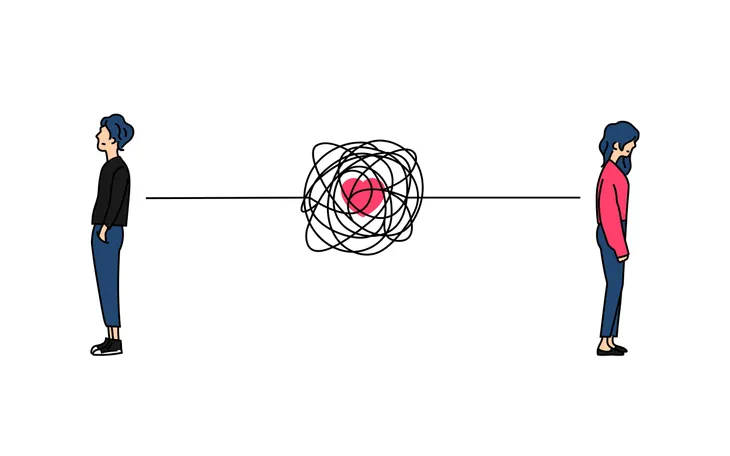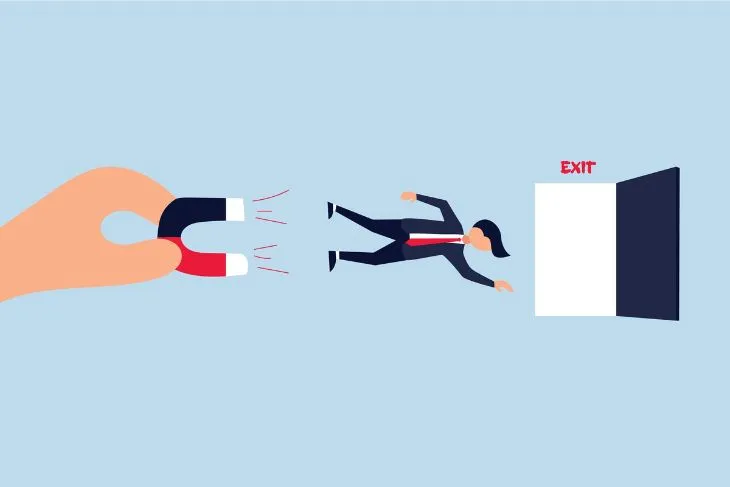- Narcissistic abuse is a type of emotional abuse that comes from a person with narcissistic personality disorder.
- Common signs of narcissistic abuse are gaslighting, manipulation, emotional blackmail, competition, love-bombing, ignoring boundaries, projecting, and nitpicking.
- The effects can be harmful and long lasting. They often include anxiety, depression, post traumatic stress, cognitive issues, and even impact physical health.
The best thing to do when meeting a narcissist is to set clear boundaries or keep it moving! But what if our partner or a family member is a narcissist? Narcissistic abuse is a type of emotional abuse that occurs when someone with narcissistic personality disorder (NPD) uses words or actions to manipulate another person, explains VeryWell Mind.
Narcissistic abuse is an incredibly difficult thing to endure as people with NPD often have little to no empathy and exhibit behaviors that are toxic, harmful, and abusive. It can occur between two people in a relationship, friendship, or family members. Here’s a look into the signs of narcissistic abuse and its effects…
Gaslighting
Gaslighting is a common form of manipulation. It’s the intentional act of making another person question or distrust their view of reality. They do so by pretending to have forgotten or deny a situation they were involved in, or try to cast doubt on another person’s memories or perceptions, explains MindBodyGreen. “The entire point of this technique is to remain in a powerful position in relation to others,” writes the source.
Narcissists will do this to try and make people question their own judgement or memory, making sure their own narrative prevails as the truth. Their intent is to control the narrative so that it benefits themselves.
Privacy Invasion and Ignoring Boundaries
One major red flag for narcissistic abuse is codependency. According to MindBodyGreen, victims of narcissistic abuse struggle to make independent decisions, especially if it involves physical separation. “Narcissists thrive on tipping the scales in their favor, so they may overstep normal boundaries to ensure that they are always one step ahead,” writes the source.
This includes reading their victims journals, diaries, mail, phone, or even private emails. It could go as far as not letting their significant other use the restroom alone or make decisions involving their own body, such as diet, exercise, and the clothes they wear. Other forms of privacy invasion are technological restrictions, such as GPS trackers, social media blocking, or stealing passcodes.
Emotional Manipulation
There are many different things they will try to withhold in order to emotionally manipulate their partner. This could be intimacy, money, communication, or just overall affection. They might also make future promises or use emotional blackmail. No matter what the tactic is, manipulation causes “confusion, low self-esteem, anxiety, shame and guilt,” says Choosing Therapy.
In order to punish the other person they might give them the “silent treatment” which is merely a manipulation tactic to get an apology from the other person, even if they weren’t to blame, notes the source. They may also hold intense grudges and cut people out of their lives over small things. On the other hand, love-bombing involves an abundance of affection and compliments. It’s a way to influence someone and earn their trust so they can exert control over that person.
Lying, Projecting, and Playing the Victim
These three things go together and essentially all stem from lying. Projection is when the narcissist dumps their own issues on their victim instead of taking any ownership (i.e. claiming the other person lied when they are the one who lied). They lie because they feel the need to deceit others to avoid responsibility, explains Choosing Therapy. The goal is to make the other person feel bad or guilty when they’ve done nothing wrong.
They might also try to play the victim. This is a tactic to gain sympathy and control their victims behavior, adds the source. You could also call this ‘twisting,’ adds the source. “When a narcissist is confronted, they will twist it around to blame their victims for their actions. They will not accept responsibility for their beahvior and insist that their victim apologize to them,” writes the source.
Verbal and Emotional Abuse
When we think of abusive relationships, violence, emotional, and verbal abuse are often what first comes to mind. Emotional and verbal abuse is a common tactic in narcissistic abuse because it wears down their victims self esteem to the point that they don’t even trust their own judgement. Emotional abuse often takes the form of belittling or degrading their partner, explains MindBodyGreen, even if it’s just in subtle ways.
On the other hand, verbal abuse is much more overt (i.e. name calling, blaming, threats, etc). While narcissistic abuse tends to focus more on emotional and verbal abuse, they may still exhibit some physical violence by breaking things, threatening to hurt others, or inflicting self-harm, notes MindBodyGreen. Their main goal is to garner attention, so if their other forms of manipulation aren’t working, they may resort to violence.
There might also be some financial abuse which involves controlling a person through economic domination, says Choosing Therapy, or draining finances (i.e. extortion, theft, gambling, accurring debt, etc).
Social Isolation
Social isolation is a common tactic used in abusive relationships. The abuser will work to remove all support systems (i.e. relatives, friends, and social networks). They’ll make themselves the sole replacement for these relationships as their primary source of affection, attention, and support. This also helps to keep them away from outsiders who may try to rescue them from their abuser.
MindBodyGreen warns they may also try to break bonds by telling lies, speak poorly about their partner’s loved ones, or create confrontation or emergencies to distract their partner or keep them busy from making plans with others.
Exploitation and Objectification
Narcissists view other people as objects that exist for their own personal benefit or to meet their own needs. As a result, they frequently take advantage of others through exploitation and objectification.
Choosing Therapy warns that they’ll do so without guilt or shame. “They do not think about how their actions affect others, leaving their victims feeling unloved and uncared for,” writes the source. All of this is done without regard for the other persons feelings or needs.
Hoovering
Hoovering is another common tactic of narcissistic abusers. The technique was coined after the vacuum company because it works to suck a person back into a toxic relationship. They want to bring them back into their orbit, explains MindBodyGreen. It typically comes into play when the abuser feels like they are losing control.
To do so, they might try to placate their victim by finally acknowledging their feelings and even easing prior restrictions. “But this refractory period tends to be rather brief,” writes the source. As soon as they gain their victims trust back, they’ll recommence the cycle of abuse.
Negative Contrasting and Nitpicking
Negative contrasting and nitpicking can also be seen as a form of emotional abuse as it works to chip away a person’s self esteem. According to Choosing Therapy, negative contrasting paints the victim in a negative light and pits them against the narcissist or other people.
While some criticism in a relationship is normal, constant nitpicking can be detrimental to a person’s mental health. Narcissistic abuse often involves nitpicking to the extent that a person feels like everything they do is wrong. Talk Space points out that someone with NPD will often criticize another person’s appearance, behavior, and even the sound of their voice.
Compete, Sabotage, and Ignore Achievements
Narcissists like to feel superior which is why they will make anything and everything a competition and cheat in order to win. They’ll also ignore their partners achievements. Talking about them will trigger their insecurity and jealousy, explains Choosing Therapy, so they’ll avoid acknowledging them.
They might even go as far as trying to sabotage their partner by talking about them behind their back, making up lies to discredit their accomplishments, or interfere with their endeavors or relationships for the purpose of revenge or personal advantage, adds the source.
It could even go as far as being classified as character assassination or slander. This often takes the form of malicious gossip or simply spreading lies about their victim to other people.
Effects of Narcissistic Abuse
Anxiety and Depression
Survivors of narcissistic abuse often live with a great deal of anxiety. This may carry over into any new relationships they build. While it might seem strange, they could even experience some separation anxiety which leaves them panicked and disoriented when they aren’t with their abuser, explains VeryWell Mind.
Not surprisingly, many people who experience narcissistic abuse also develop depression. The longer their time with the abuser the harder it is to get past their feelings of worthlessness or hopelessness. This is the aftermath of all the manipulation and negativity. “After years of being manipulated and gaslighted, you may also isolate yourself, which can make feelings of depression worse,” writes the source. Anxiety attacks, panic attacks, depression, or hypervigilance after abuse will ease overtime. Professional treatment is often necessary.
Post-Traumatic Stress
Experiencing narcissistic abuse can cause post-traumatic stress. The victim is left in a constant state of high alert, looking for danger. “This is because the traumatic events triggered a fight or flight response within you,” writes VeryWell Mind. “As a result, anything associated with those memories can trigger an anxiety attack.”
The need to be on guard 24/7 is a result of never knowing what their abuser was going to do next. VeryWell Mind notes it might be hard to relax because of the hyper-vigilance. There may be this feeling of anticipating an attack or the abuser around each corner. To cope, it might help to avoid certain places or people that serve as a reminder.
Cognitive Issues
Other mental health effects are more cognitive. You might find it hard to concentrate throughout the day. It could be so bad that it interferes with everyday life. You might find it difficult to complete simple tasks or even sit and watch TV. “Memories of traumatic events are known to interfere with concentration and focus,” writes VeryWell Mind.
According to the source, narcissistic abuse can even result in some memory loss, particularly short-term memory. “This is because the brain releases a surge of stress hormone when traumatized, affecting the hippocampus region in your brain.”
Physical Health
The effects of abuse aren’t just mental, they can be physical too. People who endure narcissistic abuse often experience headaches, stomachaches, or body aches, explains VeryWell Mind. These are often all side effects of post-traumatic stress, depression, or anxiety.
Another common physical effect is difficulty sleeping. This might occur because it feels impossible to turn the brain off or not think about what happened to them, notes the source. You might also experience nightmares from the trauma that occurred.

















